Harry Potter and the Theory of Cognitive Dissonance: How did Fudge keep denying Voldemort’s return?

Throughout the Harry Potter series we can see some interesting psychology at work. In Harry Potter and the Goblet of Fire and Harry Potter and the Order of the Phoenix, for example, when Cornelius Fudge keeps denying Voldemort’s return to his ‘proper’ physical form. Besides the obvious reasons a person might not like the thought of someone like Voldemort returning, there’s also a psychological mechanism at work in this denial. In this article we will discuss how Minister for Magic Cornelius Fudge refuses to accept Voldemort’s return through a mechanism known as Cognitive Dissonance. It’s not the only one , of course, but it’s certainly very interesting.
Disclaimer & sources can be found at the bottom of the page.
A quick recap: After the events at the end of Harry Potter and the Goblet of Fire, it is clear that Voldemort has returned. However, Cornelius Fudge doesn’t want to accept that. He is desperately trying to keep the peace he and his ministry have worked so hard to maintain. When Dumbledore explains to Fudge why it’s evident Voldemort has returned, Fudge is not shy about disagreeing (Goblet of Fire, p. 703 – 715). Fudge and his ministry publicly deny the return, branding Harry and Dumbledore as mad men who should not be believed. Furthermore, Cornelius Fudge even threatens to sack anyone at the ministry who does side with them (Order of the Phoenix, p. 71). His statements cause great divides among the wizarding community, even within families and groups of friends. Fudge’s disbelief leads him into more and more trouble and complex schemes to discredit Harry and Dumbledore.

“You-Know-Who… returned? Preposterous. Come now, Dumbledore […] you- you can’t seriously believe that. You-Know-Who, back? Come now, come now … certainly, Crouch may have believed himself to be acting upon You-Know-Who’s orders – but to take the word of a lunatic like that, Dumbledore…” (Goblet of Fire, p. 704)
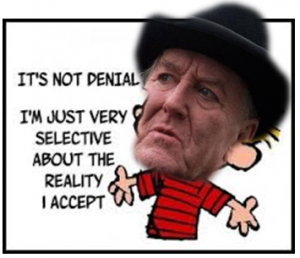
Minister for Magic Cornelius Fudge denies the return of Voldemort,
which turns out to be a very dangerous move. (source)
Cognitive Dissonance (dissonance = lack of agreement or harmony). This feeling occurs when people are confronted with two thoughts or ideas (“cognitions”) that don’t really go together. There are three important categories of cognitive relationships (Festinger, 25-28). We will explain these through some examples.
- Consonant relationship (when to things do go together)
“I like cheese,” and “therefore I will have cheese for lunch.”
“Alex is nice,” and “Alex and I are good friends.”
Both sets of statements make sense when the first statement of each pair is connected to the second. - Irrelevant relationship (When the things aren’t very much related. So, you can’t really tell if they are consonant or dissonant)
“Alex is nice,” and “I will have cheese for lunch” are two statements that aren’t really connected. That’s why this is an irrelevant relationship. - Dissonant relationship (when things don’t go together very well)
“I’m allergic to cow’s milk,” and “That’s why I’m going to drink 3 glasses of cow’s milk in a few minutes” are dissonant.
“He has to work with costumers he does not like all day. His tasks are tedious and repetitive. He only works at company X because he needs the money,” and “That’s why he loves his job.”
These pairs don’t really make logical sense, and kind of make you go “Huh? How? Why?” This feeling is cognitive dissonance. - Cornelius Fudge’s case (dissonant)
Harry Potter and Dumbledore: “Voldemort is back. We are all in great danger.”
Fudge’s persistent belief: “There is peace. Hardly anyone has seen Voldemort. He’s widely believed to have died.” He experiences dissonance, and reasons that Voldemort is not back.
In this comic the mechanism is made quite explicit, but the trick with cognitive dissonance is that it often happens without realizing it. (source)
The concept of cognitive dissonance is closely related to confirmation bias. This is the idea that we are far more likely to accept facts and information that confirm what we already believe (Nickerson, 175-220). It means that the stronger our belief is, the less likely we are to be swayed by counter evidence. Particularly, just after the events at the end of the Goblet of Fire, hardly anyone has seen Voldemort. This makes it much easier for Fudge to deny the return. However, over the course of the Order of the Phoenix, the evidence keeps increasing…
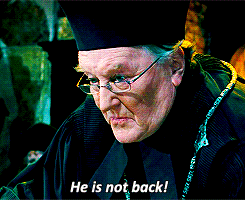
If the sentiment is extremely strong, all the evidence that supports belief they hold (here, the belief that Voldemort isn’t back) starts to seem all the more likely. In Fudge’s case, this would include the fact that hardly anyone had seen Voldemort in his physical form as of that moment, and there hadn’t been that many incidents yet. Even when the mass breakout from Azkaban of January 1996 points towards the truth, he refuses to accept it.
“Accepting Voldemort’s back would mean trouble like the Ministry hasn’t had to cope with for nearly fourteen years. Fudge Just can’t bring himself to face it.” (Order of the Phoenix, p. 94)
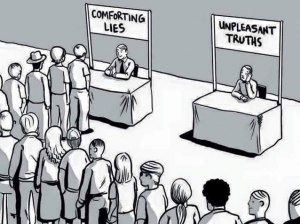
Furthermore, Fudge had spent a lot of time working towards increased safety and peace. Voldemort being back would almost imply that work had actually had very little effect in the end. So in a sense Fudge’s denial can also serve as self-image protection. He worked really hard to ensure peace and safety after the first Wizarding War. He has a self-image of him being a decent minister – whether the readers agree or not is a different matter. Therefore, he is less likely to believe something that would virtually make his hard work worth less.
Support our Patreon for access to exclusive content and chances to win free stuff!
What Cornelius Fudge does
Because Fudge’s increasing disbelieve and the dissonance also lead to him looking for other explanations for what is happening. As a result he becomes paranoid enough to be convinced that Dumbledore is after his job; “Fudge thinks Dumbledore’s plotting to overthrow him. He thinks Dumbledore wants to be Minister for Magic.” (Order of the Phoenix, p. 93)
He promotes Percy Weasley to Junior Assistant to the Minister for Magic. The Weasley family suspects that Percy (Weasley) only got his promotion so that Fudge can keep an eye on their family through him, and possibly on Dumbledore too. “Dad reckons Fudge only wants Percy in his office because he wants to use him to spy on the family – and Dumbledore” (Order of the Phoenix, p. 72). However, this turns out to be only the beginning, as Fudge’s attempts to keep control escalate quickly.
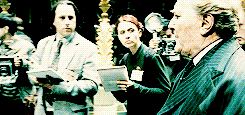
Fudge’s efforts increase when he launches a smear campaign to ruin both Dumbledore and Harry’s reputations. He does this by making statements about their suspected incredibility, as well as spreading his own ‘truths’ via The Daily Prophet. It resulted in Dumbledore and Harry quickly losing much support. As Hermione describes: “they want wizards on the street to think you’re just some stupid boy who’s a bit of a joke, who tells ridiculous tall stories because he loves being famous” (Order of the Phoenix, p. 74).
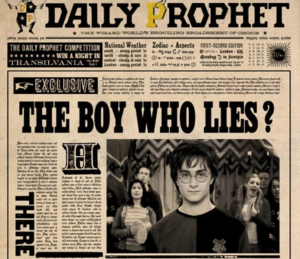
Cornelius Fudge also appoints Dolores Umbridge as High Inquisitor at Hogwarts in an effort to keep Dumbledore’s influence limited. He also does this to keep an eye on possible resistance poking its head up at Hogwarts. Additionally, Umbridge takes over the Defense Against the Dark Arts lessons to limit the learning of martial magic (source). Possibly because this would support his idea that there is peace, and therefore there is no need for children to learn martial magic. This, as you will know, does happen but in secret, through Dumbledore’s Army. When Dumbledore’s Army is discovered Dumbledore takes responsibility to protect the students and leaves. Following this, Dolores Umbridge is briefly proclaimed Headmistress. However, though the validity of her appointed is sometimes disputed as the headmaster’s office refused to acknowledge her and shut her out (source). This effort on Fudge’s part is rendered null and void, eventually.
What’s the danger of cognitive dissonance?
The trap with cognitive dissonance is that we are often not quite aware of the reasoning that takes place. The reasoning comes from very persistent beliefs, whether true or not. Because of this, we are also much less likely to notice that we’re reasoning ourselves into a comfortable situation. It is what we want to believe. Therefore we are more likely to accept the information that confirms what we already thought.
It’s so much more comfortable to convince himself Dumbledore’s lying and trying to destabilize him (Order of the Phoenix, p. 94).
Effects of Fudge’s Denial
“Dumbledore warned Fudge this would happen. He’s going to get us all killed just because he can’t face the truth.” – Hermione about the mass breakout from Azkaban that resulted at least in part from the Death Eaters being able to operate in secret due to Fudge’s denial. (Order of the Phoenix, movie)
The constant denial of the return of Voldemort by Fudge had a lot of influence. Besides, his powerful position gave his denial much more weight. It caused many Wizarding people to doubt Harry and Dumbledore. As a result the community lost valuable time they could have used to prepare themselves for the threat.
How can a person get rid of Cognitive Dissonance?
It’s generally accepted that there are three categories of ways to get rid of the dissonant feeling. Either they change one or more attitudes, behaviors or beliefs, they acquire new information, or reduce the importance of cognitions (source).
In Fudge’s case it’s acquiring new information. Seeing Voldemort in the flesh himself after the Battle of the Department of Mysteries. In conclusion, when he’s finally seen it with his own eyes, he at last accepts the truth in June 1996.
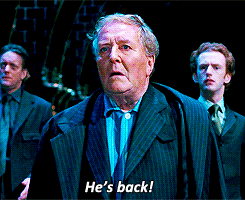
Disclaimer: unfortunately we had to leave out certain details about the events discussed in this article for the sake of comprehensiveness. For more information visit the Harry Potter Wikia’s related pages. We do not claim that cognitive dissonance is the only reason/method employed by Fudge. This is process is much more complicated than it might seem. There are many reasons and causes of his denial, and cognitive dissonance is just one of them.
Robert Hardy, the actor who played Cornelius Fudge sadly passed away on the 3rd of August 2017. May he rest in peace.
This is part of a new series of popular culture and psychology. What did you think? What other famous books, films and series would you like us to discuss?
SHARING = CARING
PLEASE CONSIDER SUPPORTING OUR PATREON (https://www.patreon.com/Psych2GoMagazine)
Citations and other Sources
- Festinger, L. (1957). A theory of Cognitive Dissonance. Stanford, CA: Stanford University Press.
- Nickerson, Raymond S. “Confirmation bias: A ubiquitous phenomenon in many guises.” Review of general psychology 2.2 (1998): 175.
- Rowling, J.K. Harry Potter and the Goblet of Fire. London: Bloomsbury, 2000. Print.
- Rowling, J.K. Harry Potter and the Order of the Phoenix. London: Bloomsbury, 2003. Print.
- Harry Potter and Order of the Phoenix. Dir. David Yates. Perf. Daniel Radcliffe, Emma Watson and Rupert Grint. Warner Bros. Pictures, 2007. DVD.
- Pottermore
- Harry Potter Wikia http://harrypotter.wikia.com/wiki/Cornelius_Fudge
Find more awesome stuff on our homepage!
All Rights Reserved. etc. ®.




[…] When Minister Fudge denies the return for Voldemort as a result of, for example cognitive dissonance, the wizarding community is endangered. How this happens can be found in our feature article “Harry Potter and the Theory of Cognitive Dissonance”. […]